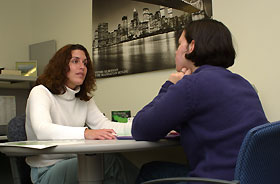|
This is an archived article.
For the latest news, go to the
Advance Homepage
For more archives, go to the Advance Archive/Search Page. | ||
|
CLAS, Others Take Steps To Improve Advising For the past three years, advisors in the College of Liberal Arts and Sciences have been concerned about students coming in at the 11th hour, wondering why they didn't have enough credits, or the right credits, to graduate. "We were helping them complete their degree, but it was time-consuming for us, and a few students had to take courses in the summer in order to graduate," says Monica Kettle, director of advising in CLAS. "We realized that some students were using the university-wide requirements listed in the undergraduate catalogue. They didn't know that the requirements in CLAS are different."
Recognizing a need for improvements in advising, the College has created a new center to help advisors help students. As part of the efforts to improve student advising, each incoming student this summer attended a two-hour seminar on advising offered by his or her intended school or college, or the Academic Center for Entering Students (ACES). CLAS officials distributed a new student advising handbook, and quizzed incoming freshmen intending to major in liberal arts and sciences on the College's requirements. Faculty advisors also are being offered more support. Through the new center Kettle heads, about 500 liberal arts and sciences faculty will receive an advising refresher course this year, including a new handbook prepared by Kettle. Some will attend training sessions offered by the College; and Kettle will attend some departmental meetings to talk about advising and the changes being made. The new emphasis on advising isn't just happening in the halls of the liberal arts. The School of Nursing is implementing a new system, and ACES - the first stop for many freshmen - has added more advisors. The often-overwhelming workload at ACES also has been eased because the College has decided to work with all its students, including freshmen and sophomores who formerly went through ACES. All three units had begun work to improve their student advising before the results of a large student survey taken last semester were available. The results largely confirmed the need for change. "The survey results were disappointing, but not unexpected," says Fred Maryanski, vice chancellor for academic administration, referring to some of the survey's less positive results. "We clearly have a lot of work to do. However, we have already instituted changes in many areas." The survey, a national instrument developed by ACT, shows that most UConn students believe advising at the University is acceptable. But the percentage of students who believe advising here is outstanding is less than at the other institutions participating in the survey, Maryanski says. The data also show that students' satisfaction with advising decreases as they progress from their first to their fourth year of college. Maryanski says the improvements that have been made in the advising system during the past few years and particularly in the past year may account for the more positive feedback from newer students. Kettle, from the CLAS advising center, notes that "one point the students made in the survey is that they want faculty advisors who are knowledgeable in the field they are going into, and who are resources for non-academic help." As part of the effort to improve advising, the College has created a new CLAS Undergraduate Advising Council. The council, which has one faculty representative from each of the College's 30 academic departments, meets monthly. In addition to general discussions on advising, members can refresh themselves on new majors, courses, and rules or policies, Kettle says. They then bring the information back to their departments, where they share what they've learned with other faculty members. "We should see the results of our efforts in four years," says Kettle, referring to the date this year's freshmen will begin graduating. "The students should be better prepared, there will be fewer course substitutions, and more satisfied students and parents." |

